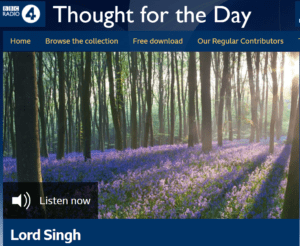 This weekend, Sikhs will be celebrating the birth anniversary of Guru Nanak, founder of the Sikh faith. He lived at a time of conflict between the two main religions of the subcontinent, Hinduism and Islam, with each claiming superiority of belief. An important thrust of his teaching was to show that despite superficial differences, both faiths recognised common ethical values of truth, justice and responsibility. He also emphasised the oneness of our human family and the dignity and full equality of women.
This weekend, Sikhs will be celebrating the birth anniversary of Guru Nanak, founder of the Sikh faith. He lived at a time of conflict between the two main religions of the subcontinent, Hinduism and Islam, with each claiming superiority of belief. An important thrust of his teaching was to show that despite superficial differences, both faiths recognised common ethical values of truth, justice and responsibility. He also emphasised the oneness of our human family and the dignity and full equality of women.
Guru Nanak, born in Punjab, taught that the one God of all people is not in the least bit interested in our different religious labels, but in what we do for wider society. Yet five and a half centuries on, in the same Punjab, the 9-year incarceration on death row of a Christian, Asia Bibi, and in Myanmar the appalling persecution of the Rohingya remind us that religious bigotry is still very much with us.
We claim to live in more enlightened times and yet in many parts of the world, religious bigotry continues to grow at an alarming rate, often leading to horrendous conflicts and the death of innocent people a situation made worse by the ready availability of guns and the trade in arms.
Religious bigotry will not go away by itself. It has to be challenged by the adherents of all faiths and by wider society. Faiths that seek to teach us how to live must be open to question and criticism. This was the approach adopted by Guru Nanak when religious rituals and superstitious practices had virtually obscured ethical teachings that are the essence of true religion. Importantly, he did not rubbish cultural practices that attach themselves to, or distort religious teaching, but in a manner reminiscent of the sermons of Jesus Christ, questioned their relevance.
When I speak to young people in a gurdwara, I say that if something said by a priest in a gurdwara defies common-sense, question it. Religious texts referring to challenges faced by a community thousands of years ago, need to be placed in the context of today’s times if they are not to be misused. Only then can religion become a true force for good in our troubled world.


